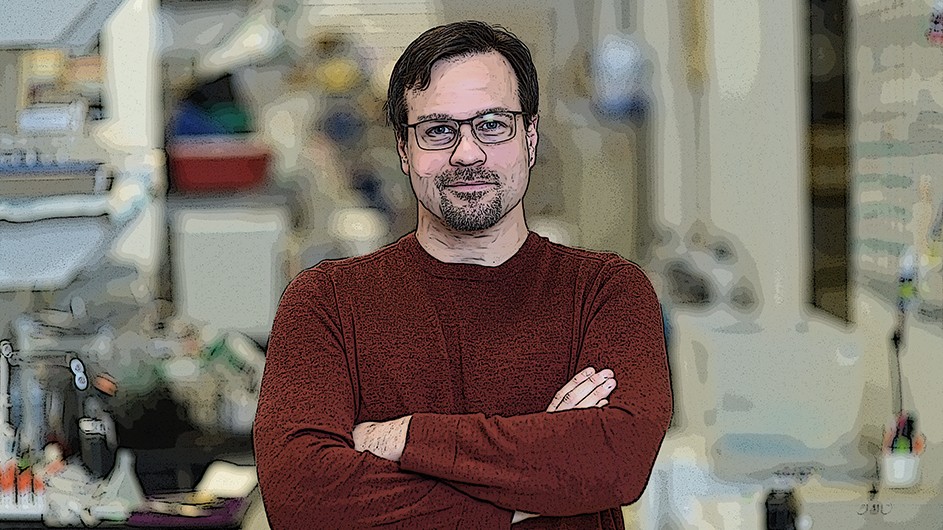The Power of Pizza and Other Lessons From the COVID-19 Pandemic
How a true rapid response to the COVID-19 pandemic was powered by a groundswell of grassroots volunteers.

"Disruptors" is a series sharing new and innovative ideas and viewpoints from Columbia Cancer researchers and clinicians that challenge conventional thinking about cancer care, research, and beyond.
Any experienced lab director will tell you: the best way to get two research teams to collaborate is to put everyone in a room, buy them pizza, and leave. That’s when the magic happens—when you empower local experts with the trust they need to get the job done.
A year ago I witnessed this magic when I responded to an email from a postdoc recruiting volunteers for the pandemic response at Columbia University. Thinking “sure, I’ll help out for a week or two until this thing blows over,” I naively clicked my way into blurry months of fire dousing and sleep deprivation, and a stunning demonstration of the power of grassroots organization. The drive to help was deep and our volunteer list quickly snowballed to more than 750 postdocs, students, and administrative staff brimming with energy. How could this incredible resource best be put to use?
Organizations generally hire sufficient staff to meet normal operational demands. But in a sudden emergency, the pace of change is unmanageable. As ambulances began arriving in droves to the triage tents of Columbia/NewYork-Presbyterian Hospital (NYPH), the demand on some units suddenly soared a hundred-fold. Teams had no time to hire and train employees; they could only respond by working to the point of exhaustion.
Simultaneously, thousands of students and staff were sent home with literally nothing to do. Our group, called Columbia Researchers Against COVID-19 (CRAC Teams), represented an extraordinary commodity: a small army of highly skilled specialists drawn from across our university. The group bridged traditional barriers of geography, schools, disciplines, and professional tracks, united by a passion to contribute during this unprecedented emergency.
Doers and Problem Solvers Unite
My immediate concern was how to harness the passion of our volunteers while keeping everyone safe and aligned with the university. Some were so eager to help that they were about ready to storm the labs to run home-grown diagnostic tests. Understandably, there were initial concerns from some administrators worried for the safety of a rogue group of affiliates operating outside the traditional administrative structure. I worked to engage university administrators at all levels to demonstrate that our group could be effective, safe, and in compliance with regulations. Ultimately, administrators came to us for assistance with complex and urgent challenges.
Rather than launch standalone initiatives that might compete with existing efforts, we became matchmakers. Approached by a unit in need, we deployed rapid response teams that could bolster the existing team and improvise new solutions. In an early example, the Institutional Review Board office that oversees research involving people was suddenly inundated with thousands of mandatory protocol status updates. We assembled a data management team (with backgrounds ranging from epidemiology to computer science) that extracted information from hundreds of emails and quickly wrangled it into a database.
Likewise, when the Columbia University Biobank set out to collect and preserve samples from every COVID-19 patient at the hospital, we doubled its capacity with a team of experienced lab scientists. This yielded a precious collection of more than 55,000 patient samples, fodder for the first wave of research studies on the biology of the new disease. Our largest project deployed over 130 volunteers as 24/7 operational support to four NYPH sites across the city.
Next Time, It Won’t Take a Pandemic
I’ve spent my career building multidisciplinary teams to tackle hard problems in biomedicine. Nothing makes me prouder than watching trainees take ownership of a problem and emerge as leaders. This growth often takes years to blossom, but last spring, it was a daily occurrence. The thirty or so officers and project leaders needed only to be pointed at a problem and it would be solved. This was possible for three reasons: the availability of hundreds of capable and committed volunteers, the trust that administrators invested in our group to solve hard problems, and the ability of our volunteers to effectively bridge between groups that may not have interacted before. Despite our success as a collective, few of us have ever met in person. We dream of someday gathering for a barbeque, everyone walking around with their screen names and Slack team IDs scrawled on stickers.
A year later, the conflagration that precipitated CRAC Teams burns more slowly, hopefully to be extinguished in the coming months. What I most want to preserve from that last difficult spring is the spirit of engagement and trust that enabled our group to succeed. It shouldn’t take a worldwide pandemic to divert us from the well-worn ruts that canalize our daily routine.
My advice to institutions: rather than granting awards to senior faculty and institute directors, incentivize your non-faculty affiliates with well-funded grand challenges. Gather anyone interested and let them coalesce into multidisciplinary teams while you stay out of the way. My advice to trainees: don’t wait to be asked. Go find partners in another discipline and get creative. Test your great idea without telling your supervisor. If they are anything but thrilled to see you step up, well then, your next pizza is on me.
Kenneth P. Olive, PhD, is an associate professor of medicine at Columbia University Vagelos College of Physicians & Surgeons and the director of the Oncology Precision Therapeutics and Imaging Core (OPTIC) at the Herbert Irving Comprehensive Cancer Center. He focuses on translational research and pancreatic cancer.